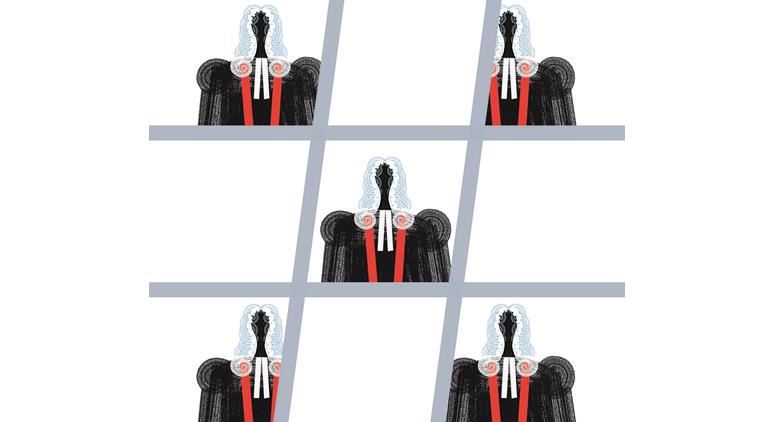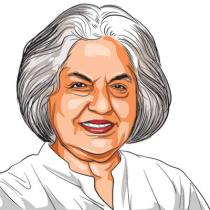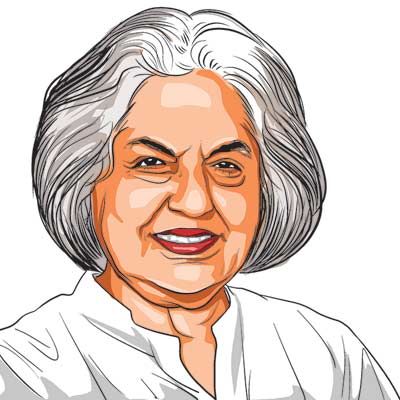Know thy judge
India’s institutions can learn from the Brett Kavanaugh hearing. The MeToo movement can help bring greater accountability in the judiciary.

(Illustration: C R Sasikumar)
Judge Brett Kavanaugh has been confirmed as a judge of the US Supreme Court but the process allowed Christine Blasey Ford to publicly recount her trauma of sexual abuse in exercise of what she considered her “civic duty”. We are enriched in our understanding of the people who eventually hold high positions of authority. This is how a democracy functions.
India has no similar process for appointment of judges to the Supreme Court or any other court. We have what we call a “collegium” of the five senior-most judges of the Supreme Court considering names primarily from among chief justices of the high courts and occasionally from the bar for appointment to the Supreme Court. The future chief justices of India will be chosen from a pool of judges in the high courts, who have today put in more than 14 years of service. Those who have or have had a relative in the judiciary have a better chance of making it compared to others. An aspiring law researcher with a little help from Google Analytics will be able to predict who will be the CJI of India in 2039.
Unlike in the US, where the collegial approach spans the whole nation and virtually the world, our collegial impulses are confined to five learned men. I was impressed by Ford when she said “in the university I am used to the collegial approach”, an approach meant to take us all on board in participating in national decision-making.
Why is it so important for you to know your judges before they are appointed? Because they decide what you eat, what you can and cannot say, who you can have sex with and whether or not you can visit a temple. That is not all. They decide matters of life and death, guilt and innocence, detention and freedom, bail or jail. They decide who is a terrorist and who is not. There is no aspect of our life which is not governed by the law and judges are the ultimate interpreters of the law.
The process of confirmation of a judge in the US Senate is intended to check, publicly, the suitability of a nominee for appointment as a judge. The political orientation of the nominees is likely that of the nominating government. Yet, the process of public scrutiny is intend to check if the nominee is capable of an objective approach to legal and constitutional reasoning on issues of national importance. Not every judge nominated by a Republican President has decided in blind faith to uphold the policies and laws of a Republican government. Most observers see Judge Kavanaugh as having failed that test of objectivity as also the test of suitability of temperament, given his childish loss of temper, inability to answer questions in a straightforward way, sarcasm, and what is worse, the possibility that he may have lied. He polarised the debate into us versus them and was thus seen as incapable of being a judge in the true sense of the word.
No such process occurs in India prior to the appointment of a judge. There is good reason for such a reform to be made. As the chief justice designate, now the CJI said, “we live in divided times”. At a time like this, we need to develop a bipartisan approach to the health of our national institutions. Given that on an average, the age for appointment of a High Court judge is 45 to 50 years and to the Supreme Court 60, each one of the nominees, whether nominated by the government or the collegium, would come to the process with a body of work behind them and a political and social orientation. If the government of the day were to nominate a judge for confirmation, we do know that they would choose a person who shared their political persuasion.
It is this background that must be made known through a process of public hearings. The NJAC failed in this respect in not providing the opportunity to publically evaluate the proposed nominee. Evaluation of government nominees by five wise men was simply not a constitutional option. On the other hand, a transparent process would have been an alternative to the existing opaque process. The replacement of one opaque process by a political process would have meant that we had a client judiciary. An opportunity for reform lost for want of transparency.
The problem in India is we are denied information relating to a proposed appointee and are often left with little more than rumours and suspicion about the antecedents of a judge. This does incalculable damage to the legitimacy of the decisions of the court. Intentions behind a judgment begin to be doubted.
We know that there are and have been judges on the SC who were office-bearers of the ABVP and other political formations. Today, we talk of our judges being “liberal” or “conservative”. There is now even talk of judges being “urban Naxals”. To avoid such post-appointment slander affecting the legitimacy of judges in these “divided times”, we need a new process of appointment of judges and new criteria for evaluation which will capture what we expect from them. The so-called background check by the IB of a sarkari or a collegium nominee leaves much to be desired.
Justice can be subverted in many different ways, it is not confined to money changing hands. The most dangerous form of subversion of justice is succumbing to the wishes of the executive in matters pending before the court, beyond the call of conscience.
Given the entry of women in large numbers in the judiciary, there is a possibility of subversion of justice in the form of sexual harassment of sitting women judges in the subordinate judiciary by their seniors in the guise of exercising their supervisory powers. Pre-appointment background checks must include allegations of sexual harassment against them. Such people are normally repeat offenders and a little investigation would show up their lack of character in dealing with women. The IB has no mandate to check for predatory behaviour of the nominee towards women and such behaviour can pass through the net very easily. This would be the contribution of the MeToo movement to accountability in the judiciary.
The writer is former additional solicitor general and senior advocate, Supreme Court
For all the latest Opinion News, download Indian Express App
More From Indira Jaising
- Removing biasesSupreme Court verdict in Jarnail Singh case restores the principle that reservations are intended to achieve equality in representation...
- Crime and consentIn reconsidering the constitutionality of Section 377, Supreme Court must affirm that criminal law has no place between consenting adults...
- Right to Privacy: A Brake On GovernmentRight to privacy judgment finally consigns the Emergency to the past..








































No hay comentarios:
Publicar un comentario